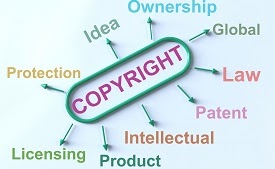The digital age has made it easier than ever to copy and distribute a wide variety of material. Images, text, music and audio-visual content can all be reproduced and shared again and again at the click of a button. If your business is the one producing this content, how do you protect your copyright?
One of things we have learnt while talking to clients is that copyright is not very well understood by many Australian business owners, and as such they might be missing out on potential claims. They might also be putting themselves at great financial risk by breaching copyright themselves.
Regardless of the industry of your business, it is worthwhile checking out the following copyright guide. You might learn a valuable lesson in shielding your business against copyright infringements by your competitors or ways to avoid the penalties of copyright infringement yourself.
Can I claim copyright?
If your business creates any original logos, drawings, designs, newsletters, music or audio-visual works – then it’s likely that you are the owner of the original copyright. This affords you legal protection against others using or infringing that copyright in certain circumstances.
What type of creative work is covered by copyright?
In Australia, for creative work to enjoy copyright protection, it must be in material form (hard copy or electronic) and have a sufficient connection to Australia. The protection afforded includes exclusive economic rights (for a limited time). Copyright in artistic works lasts 70 years from the date of first publication, 50 years for radio & television broadcasts and 25 years for published editions.
Types of work covered include:
-
- writing
-
- photographs
-
- computer programs
-
- art and illustrations
-
- dramatic and musical works
-
- films
-
- sounds recordings
-
- radio and TV broadcasts
-
- publications
What type of creative work isn’t covered by copyright?
With a few exceptions, copyright law doesn’t protect:
-
- ideas, concepts, styles techniques and information
-
- names, titles and slogans
-
- people and people’s images
When work is commissioned, who owns the copyright?
Generally speaking, creative work like company or business drawings, logos, photographs, newsletters and other visual imagery will be protected by copyright. That being said, if you’ve commissioned work from a graphic artist, they might own the copyright (unless you have an agreement to the contrary).
When in doubt as to who owns the copyright to a certain piece of content, and what impact this will have on your ability to reproduce it, it’s highly advisable to consult a lawyer.
When does copyright infringement occur?
Infringement occurs when another person or business makes copies or exploits a work commercially without the copyright owner’s permission. For copyright infringement to occur, there must be a “substantially similar” reproduction and the subsequent work must have been copied from the original. Creating very similar work independently does not necessarily constitute infringement.
What happens when you can prove copyright infringement?
Once copyright infringement has been proven, there are various avenues of redress that you can pursue. These include:
-
- seeking an injunction from the Court restraining the person or company from reproducing the original work
-
- seeking an order from the Court to enter the person’s or business’s premises and seizing the offending material
-
- commencing court action to claim for damages, an account of profits or delivery up of the infringing article/s.
Murfett Legal is here to help
Given the ease at which digital material can be reproduced and shared, copyright infringement is becoming increasingly common in the Australian business world. Failing to recognise when your copyright has been breached and act on it can hand your competitors an advantage and allow them to benefit from your hard work. As ignorance of the law is no defence, you need to ensure that your business is not guilty of copyright infringement.
If you think you might have a copyright infringement issue to deal with the, get in touch with us today. Our expert team can help clarify things and advise you on the best course of action.
Note: The above is a summary for general information purposes only. It is not intended to be comprehensive or constitute legal advice. You should seek formal legal or other professional advice in relation to your particular circumstances before relying on the content of this article.
For further information or assistance contact Murfett Legal on +61 8 9388 3100.
Email: [email protected]
Murfett Legal is a leading law firm in WA, providing services in litigation, corporate and commercial, employment and workplace relations, insolvency, debt collection, business restructuring, Wills & estates, property, leasing, settlements, liquor licensing and intellectual property.




